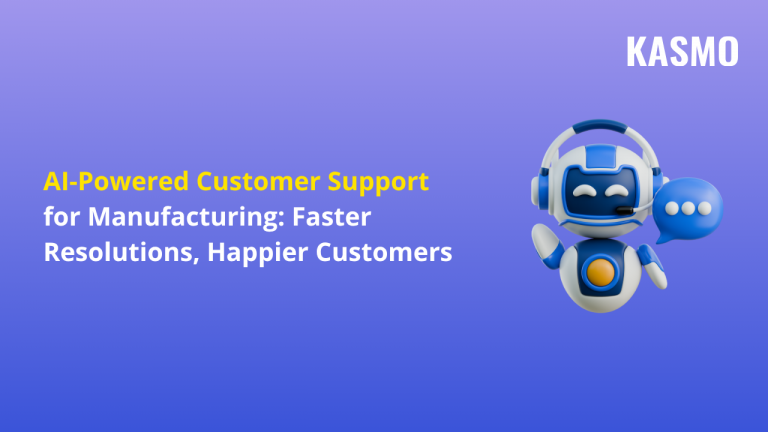What if your customers could solve most of their service issues without reaching the support team? Yes, this is possible through customer portals. According to Harvard Business Review, 81% of users prefer to solve problems themselves before contacting customer service representatives.
Customers expect quick answers, accurate service, and the freedom to resolve problems on their own terms. Long wait times, improper support, and lack of visibility often increase the risk of losing customers’ trust and loyalty. Manufacturing companies deal with complex equipment, intricate processes, and long-term customer partnerships, this makes it essential to maintain good after-sales service. One-size-fits-all support does not work anymore—customers need portals that provide precise technical help, live updates, and personalized experiences that address their exact product query and provide resolution instantly.
In this blog, we’ll explore the challenges manufacturing customer portals have, how Salesforce’s AI-powered customer support helps resolve them, and the role of Kasmo’s ReSolve AI accelerator in enhancing customer experience.
What is a Manufacturing Customer Portal?
A customer portal, also called a self-service portal, is a secure online platform, accessible through a company’s website or mobile app. It empowers customers to manage their interactions directly with a business. By logging in with authenticated credentials, the portal provides service by analyzing customer data such as purchase history, warranties, service records, and loyalty status.
In manufacturing, a customer portal helps customers, distributors, or end users to independently access the information and services they need without relying on manual support. A well-designed manufacturing customer portal acts as an interactive problem-solving platform. Instead of waiting on hold with customer service or chasing email updates, customers can:
- View and update their personal profile and account details.
- Access purchase history, warranties, loyalty points, or subscription details.
- Track the status of product orders, deliveries, or repairs in real time.
- Submit service requests without waiting for an agent.
- Schedule or reschedule appointments, such as field technician visits.
- Get query resolutions with FAQs, manuals, and troubleshooting guides.
For distributors and partners, customer portals help by:
- To gain real-time inventory visibility of stock to plan orders and avoid shortages.
- Manage orders, request quotes, and track approvals online.
- Gain access to pricing and contract terms without delays.
Customer portals empower both end users and partners to resolve their queries instantly, improve satisfaction, and lower the burden on support teams. When human intervention is required, the portal transfers the issue by creating a case, appointing a technician, or connecting customers with the service representative.
Challenges in Manufacturing Customer Portals

Data Integration
The major challenge with manufacturing customer portals is managing and integrating data across multiple systems. Manufacturers rely on decades-old ERP, CRM, or production systems, which do not collaborate with modern digital portals. When data is fetched for multiple disconnected systems, customers may see outdated or inconsistent details on orders, pricing, or service history.
Difficulty in Finding the Right Answers
Manuals and guides are often written in long PDFs or scattered across different places, making it hard for customers to quickly find what they need. This confusion leads to frustration, and customers tend to seek call support even for simple issues.
Delayed Human Support
When an issue can’t be solved through self-service, customers face long wait times before a case is created and a technician is dispatched. This lag in escalation often makes customers feel ignored and reduces trust in the company’s service.
Complex Product Support
Manufactured products often involve intricate designs and technical specifications. At certain times, customers facing issues require more than just basic assistance—they need support teams with deep product knowledge. Without specialized expertise, customers struggle to troubleshoot issues and receive accurate, high-quality guidance.
Managing Long-Term Relationships
Several manufacturing products have long lifecycles, creating the need for maintaining consistent customer service. This requires tracking historical interactions, service contracts, and ongoing maintenance and support. Building and sustaining these long-term relationships requires robust systems.
Rigid Scheduling and Lack of Guidance
In the case of technician support, customers expect flexibility in rescheduling visits and other updates. They often encounter rigid appointment slots, limited visibility, and poor guidance based on their history or sentiment. This has a negative impact on the customer service experience.
Key Features Every Manufacturing Customer Portal Should Have
Self-service Functionality And 24/7 Accessibility
The most important aspect of a customer portal is the self-service functionality available at any time. AI in customer support provides 24/7 support that allows clients to place orders, access technical documentation, and find solutions on their own, regardless of time zones or business hours. This reduces the workload for support teams, and customers gain quick assistance. Clients can request quotes, track order status, review order history, and troubleshoot issues using guided resources and downloadable manuals, without the need.
Real-Time Order and Inventory Tracking
In manufacturing, supply chain disruptions and production delays can have major operational impacts. A strong customer portal gives clients real-time visibility into inventory levels, product availability, lead times, and order progress. Customers can track their orders and anticipate delivery timelines, while clients and distributors can plan production or restocking schedules more efficiently. This real-time status allows accurate management, reducing disruptions and building trust in the manufacturer’s reliability.
Personalization And Role-based Access
Every client has unique needs based on equipment model, purchase history, and operational priorities. An effective portal delivers a personalized experience, presenting only the most relevant information, recommended products, or service options. For B2B clients, this includes pricing, contract-specific terms, and product-specific documentation. For end users, it includes access to manuals, maintenance schedules, or warranty information. Personalization simplifies customer support with accurate service and saves time.
Integration And Automation Capabilities
A manufacturing customer portal must seamlessly connect with ERP, CRM, inventory, accounting, and field service systems to provide real-time information. Automated data synchronization ensures order status, inventory levels, and service records are always up to date, eliminating manual errors. These capabilities create a unified digital ecosystem, making it easier for customers to access reliable information, place orders, and manage service requests efficiently.
How Salesforce Improves Manufacturing Customer Support?
Salesforce brings capabilities to manufacturing portals through Experience Cloud, which offers customers a seamless self-service hub. These portals allow end users and partners to track work orders, access service history, manage asset details, and find technical guidance—reducing reliance on service agents while boosting customer satisfaction.
Manufacturers can create unified and secure virtual customer support portals where users and distributors log in to access personalized services and information. They can integrate the portal directly with Salesforce Field Service to show active work orders, technician visits, schedules, and other details in real time. Improves self-service as customers can raise new service requests, follow the status, and find troubleshooting resources easily. Customers can also gain intelligent assistance with Agentforce, as the portal provides contextual guidance, recommends best actions, generates service reports, and provides accurate stepwise guidelines. This helps manufacturers to improve customer service and drive trust and loyalty. 
Kasmo’s ReSolve AI on Salesforce: Turning Portals into Problem-Solvers
ReSolve AI is a smart, AI-powered assistant designed to help manufacturing customer support teams and even customers solve problems faster and more independently. It acts as a personal, 24/7 support expert, ready to guide customers and resolve issues with real-time insights. It uses advanced AI and real-time data from the Salesforce Data Cloud to analyze product information. This helps to easily understand complex technical knowledge and enhances the overall customer experience.
It is an intelligent AI agent that can be directly integrated into Salesforce Experience Cloud. It analyzes manuals, technical guides, and service records to provide users with step-by-step solutions for product issues, warranty queries, or maintenance questions. This avoids waiting on hold, navigating scattered documents, or representative support. It enables distributors to handle order inquiries, technical support, and service requests, making interactions faster and more reliable.
ReSolve AI can also:
- Automatically raise service cases or tickets in case of human assistance and also assign technicians. It coordinates with field technician visits when issues need hands-on attention.
- Manage appointments, including rescheduling or providing pre-visit guidelines by analyzing customer historical data.
- Provides contextual recommendations for customers, for example, parts, upgrades, or add-ons that help solve problems and also upsell opportunities.
- Faster resolutions, lighter support load, handles routine inquiries and common problems autonomously, freeing support teams for complex cases.
- Finally, it can gain feedback and trigger follow-ups to ensure issues are fully resolved. It also ensures customers are well-guided and supported throughout the service journey, which in turn increases customer satisfaction.
By combining predictive intelligence, technical expertise, and automation, ReSolve AI transforms manufacturing portals into problem-solving platforms that reduce downtime, improve first-time fix rates, and elevate customer satisfaction for both end users and partners.
Conclusion
Manufacturing customer support doesn’t just include resolving issues—it’s more about delivering fast, accurate, and personalized experiences to build customers’ trust and reduce operational friction. Salesforce Experience Cloud with Agentforce (customer support AI agents) enables manufacturers to transform their portals from static information sites into intelligent, problem-solving, and self-service platforms. Kasmo’s ReSolve AI accelerator takes this a step further by providing predictive issue resolution, automating case handling, virtual customer support, and active follow-ups. This reduces manual workloads, accelerates issue resolution, and reduces service team burden, which improves customer experience and satisfaction.
Kasmo’s deep expertise in Salesforce helps manufacturers to enhance customer support by designing and implementing Salesforce-powered portals and ReSolve AI. You can combine real-time product data and automate service workflows to ensure customer service is accurate and effective. Drive manufacturing service efficiency and boost long-term relationships with Kasmo.




